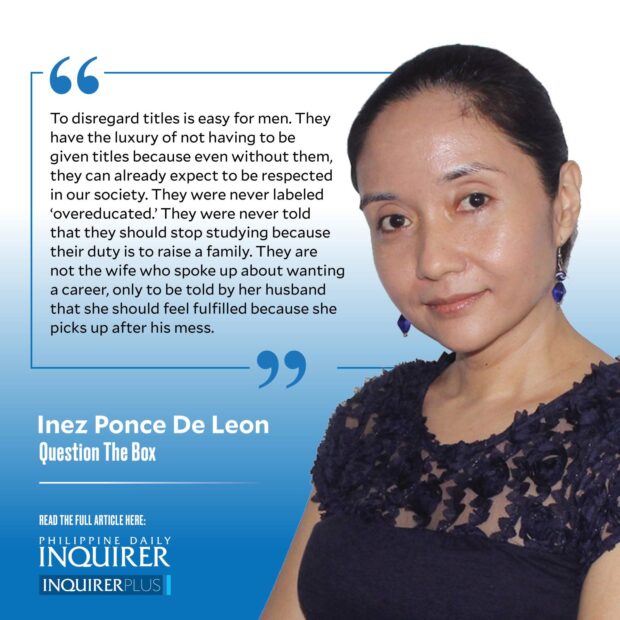Confronting reality and identity
I once met Sandra Harding, proponent of Standpoint Theory, at a research conference. Harding’s Standpoint is a richly layered treatise on culture and identity. One aspect runs thus: If you want to know what is really happening in society, don’t talk to people in power. Listen to those who have been marginalized because they have a truer grasp of reality.
I introduced myself to Harding as a Filipino professor. She smiled, shook my hand, and sighed, “Your president is a disgusting man.”
Rodrigo Duterte’s statements back then had already spread across the world, right into the ears of a scholar who had long worked on uplifting women. Little has changed since then.
We might extol our country for giving equal pay to both sexes. Individuals can boast all they want about respecting women. Statisticians can parade all the numbers they’ve got. Our national culture, however, is patriarchal, and our women are unsafe both in spaces and discourse.
This issue came up, somewhat, a few weeks ago, when a female professor from another university spoke out online. She bristled when her students called her “Miss”; she also wished she could be called “Doctor” because she had worked so hard on her Ph.D.There are two major ideas here, but only the latter one prompted rebuke on social media, where pundits called out the overuse of honorifics.
To disregard titles is easy for men. They have the luxury of not having to be given titles because even without them, they can already expect to be respected in our society.They were never labeled “overeducated.” They were never told that they should stop studying because their duty is to raise a family. They are not the wife who spoke up about wanting a career, only to be told by her husband that she should feel fulfilled because she picks up after his mess.
Their identity was never used as diminution (“babae lang”) or justification (“babae kasi”). They never had to deal with friends, family, and even colleagues who looked at women as mere vessels for society’s whims.Some people tell us to simply ignore the labels and keep working.
This is selfish. It tells us to advance without thinking of the women who have yet to realize their careers, to understand their role in society, to know their paths. To ignore society’s ills is to allow the same oppressive structures, language, and cultures to be perpetuated. To ignore the ills means we make no real change.
Equally reprehensible is the woman who declares that she does not see herself as a woman, but as an “individual.” In doing so, she erases her identity while dismissing the problems that other women face. She allows society to pressure her into obedience, to act like a man to be legitimized, to punch someone in the face to get her point across.In scolding the female academic, therefore, we dismiss her view of reality. We also ignore the other aspect: The idea of being addressed as “Miss.”
At the college level, we often use “Ma’am.” In my classroom, students have to be reminded that they are no longer in high school, where they wait for Ms. Teacher to give them information. “Ma’am” is a reminder for both sides: for students to think and act independently; for me to be their mentor, not their doormat.The true illness of this country, therefore, needs nuance.
We see school degrees as a terminal rather than calls of duty. We focus on the cosmetics of titles the same way we fixate on age, weight, and height instead of true merit. We are obsessed with using job titles as mere honorifics without taking responsibility.
Back in 2018, I reassured Harding that I didn’t vote for Duterte, and that I would continue to fight against oppression on all fronts. She pressed my hand and smiled once again, “Very good,” she said.Since then, the marginalization of women has gained greater visibility. In the 2022 US elections, a Wall Street Journal op-ed criticized Dr. Jill Biden for using her honorific. The writer ridiculed her dissertation and said that those with Ph.D. in humanities and social sciences did not deserve to be called “doctor.”
Researchers across the world lambasted the writer. Those who work in the academe know that anyone who gatekeeps research is also an enemy of science. We Ph.D. holders added “Dr.” to our Twitter names, regardless of our field.
I haven’t changed my Twitter name since. The fight continues.
iponcedeleon@ateneo.edu





















